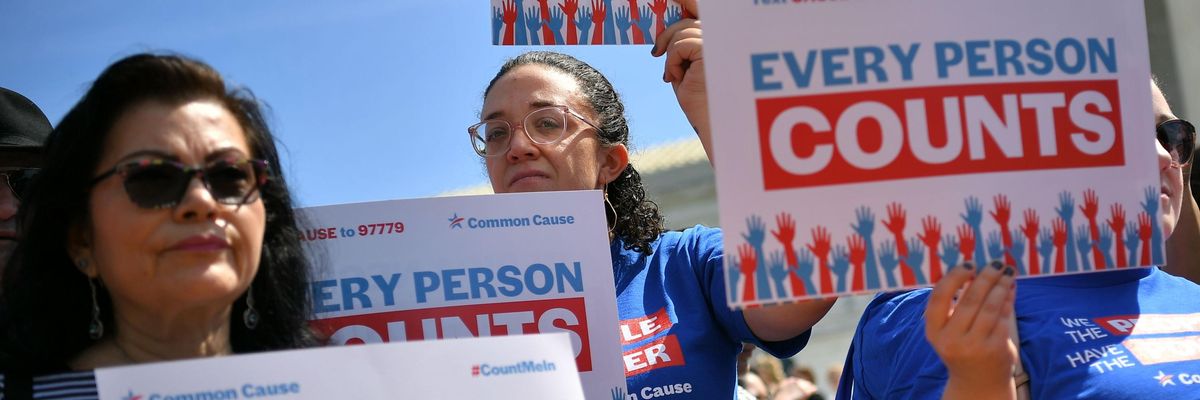Latino Americans were significantly undercounted in the 2020 U.S. Census, according to an analysis released Thursday by the Census Bureau--a result which advocacy groups said was what former President Donald Trump's administration intended to happen when it attempted to change the decennial survey.
"This was intentional."
The census miscounted the U.S. population by 18.8 million people--an overall count that was relatively consistent with past surveys but that saw communities of color undercounted at higher rates than in past years.
Following Trump's efforts to add a citizenship question and to stop undocumented immigrants from being counted for the apportionment of U.S. House seats, the undercount of Latino people tripled from 1.54% in 2010 to 4.99% in 2020.
"This was intentional," said Rep. Joaquin Castro (D-Texas), warning that "the undercount will strip Latino communities of government funding and electoral power."
The undercount for people who identify as "some other race" was also statistically significant compared to the results in 2010, rising from 1.63% to 4.34%. Black Americans and Indigenous people were also undercounted, but at lower rates than the other groups.
Meanwhile, white Americans were overcounted at double the rate found in 2010.
"These numbers are devastating," Marc Morial, president of the National Urban League, told the Post. "The warnings we gave, the concerns that we raised, were absolutely true, and today we find ourselves with a census that is neither complete nor accurate."
The Census Bureau was challenged by numerous factors in 2020, as the coronavirus pandemic delayed the survey and wildfires in the West kept census-takers from reaching people who had not filled out the questionnaire online.
Critics said as the bureau was preparing to take the census that Trump's push to include a question about whether household members were U.S. citizens would intimidate Latino residents out of responding--warning that significant damage was done even after the former president's efforts failed.
Trump also moved up the deadline for finishing the count, leading to concerns of inaccuracies among census experts.
"Terrible demographic data has many consequences in our communities, especially in public health."
"I lay this at the feet of Donald Trump and [former Commerce Secretary] Wilbur Ross and their efforts to disrupt the census and make it as difficult as possible for Latinos to participate," Arturo Vargas, chief executive of the Latino advocacy group NALEO Educational Fund, told the Post.
"I said from the beginning when the first numbers were released that I smelled smoke," he added, referring to an analysis released in September by the American Statistical Association. "Today we learned that the 2020 Census was a five-alarm fire."
Census data is used to determine the allocation of $1.5 trillion in annual funding for communities based on how many residents are reported, including funds for Medicaid, public housing, the Supplemental Nutrition Assistance Program, and highway planning. The numbers are also used to apportion U.S. House seats and draw congressional district maps.
"Terrible demographic data has many consequences in our communities, especially in public health," said epidemiologist Jessica Malaty Rivera.
Damon Hewitt, president and executive director of the Lawyers' Committee for Civil Rights Under Law, said the undercounting of communities of color "robs us of the opportunity to be the directors of our fate, reducing our representation and limiting our power while depriving policymakers of the information they need to make informed decisions about where the next hospital will be built or where the next school should be located."
"This undercount means we are saddled with inaccurate numbers for the next decade," he added. "The consequences are serious."
Correction: An earlier version of this article stated that 18.8 million people had been undercounted by the 2020 U.S. Census. The article has been changed to reflect that 18.8 million people were miscounted rather than undercounted.

